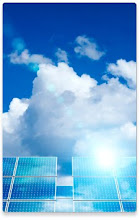Renewables have seen such dramatic price falls in the past few years that they are threatening to upset the world as we know it and usher in an almost unprecedented boom in the spread of cheap, clean, home-produced energy.
Solar will be the cheapest form of power in many countries within just a few years. In places such as California and Italy it has already reached so-called "grid parity". Onshore wind, on a piece of land not constrained by years of planning delays, is already the cheapest form of energy on earth. These are not wild claims – those are figures from General Electric, Citibank and others.
Solar PV is a case in point. Three years ago firms were paying about €3,600 per installed kilowatt of solar capacity on barn roofs in Germany. Today it can be done for just over €1,000 – a staggering 70% fall.
Thanks to a surge in global production to 60 gWp annually, (enough to supply British households – not offices or factories – with all their electricity) solar power has dropped dramatically in price. But there is more to come. Cambridge IP, a global innovation and intellectual property firm, says there is a surge of interest and R&D into two new forms of solar power which are likely to be available commercially by the end of this decade.
Newly built solar plants are already considerably cheaper than new nuclear plants per kilowatt hour of electricity produced and because of this solar energy can and will compete head on with conventional energy.
True, there is an ongoing cost from the German government's previous support for solar, but is much lower than the subsidies pumped by the western world into nuclear, coal, oil and gas over the past decades.
Solar is starting to pay its subsidy back. Germany now has more than 30 gigaWatt peak (gWp) of solar plants installed, such that on almost all days in the spring, summer and autumn, solar energy surges into the grid at a time when demand is at is strongest (air conditioning etc) and when spot market energy prices are at their highest.
This peak price is being forced down by solar, helping to reduce wholesale prices. The big energy companies hate this because this peak is where they make their money. Solar in Germany is almost down to wholesale prices – in sunnier countries it already is.
Germany (Europe's biggest economy) now gets 25% of its electricity from renewables – a proportion that is increasing by the month. This is twice the level of the UK, although, interestingly, similar to that of Scotland on its own. Germany is also leading on figuring out how to overcome the problems of "intermittency" by storing renewable energy.
Urban Energy
We are an innovative organisation specialising in the financing, design and installation of economical and environmentally sound green energy solutions for homes and businesses in the South West.
We only install products that lead the way within the renewable energy industry and that are renowned for their high quality and ecologically sound production. This reflects our own high standards and quality assurance.
We understand that introducing a renewable energy system i.e solar panels, to either your home or business is an investment that lasts for many years. With our in-house installation team and electrical division, it is our promise to you the customer, that your satisfaction and peace of mind throughout this period is our number one priority.
The Granary, Phillips Lane, Stratford-sub-Castle, Salisbury SP1 3YR
Tel: 0800 2321624
Email: info@urbanenergy.org.uk
Monday, 3 June 2013
Subscribe to:
Comments (Atom)

